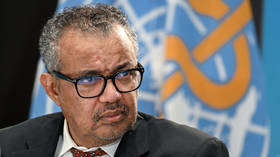Covid-19 pandemic is over – WHO

The World Health Organization (WHO) has declared that Covid-19 no longer represents a global health emergency, after more than three years and nearly 7 million dead.
WHO Director General Tedros Adhanom Ghebreyesus officially downgraded the status of the disease on Friday while stressing it remained a “global health threat.” The decision to lower the alert level was made following a meeting of experts on Thursday.
While the “emergency phase” has concluded, thousands of people were still dying every week from the virus, the WHO insisted. The WHO first described Covid-19 as a pandemic in March 2020, when the virus had spread to every continent except Antarctica.
While the disease had claimed just a few hundred lives by that time, the pandemic declaration resulted in unprecedented lockdowns and restrictions on movement and commerce, causing economic contractions that are still being felt. Since then, about 764 million cases have been recorded globally, while 5 billion people have reportedly received at least one dose of a vaccine.
While most countries have dropped their pandemic control measures, the US still has a public health emergency in effect, which is not due to expire until next week. More than 1.1 million people died having Covid-19 in the US, more than in any other country, according to WHO statistics.
In 2021 the WHO declared the virus had jumped to humans from animals, only to reverse course the following year and acknowledge that “key pieces of data” were missing in assessing if it might have emerged from a lab instead.
Earlier this week, the organization announced that the head of the international mission sent to China to investigate the pandemic’s origins had been dismissed for sexual misconduct. Peter Ben Embarek has claimed political pressure was exerted on his team, including from outside China.
Frustrated by the lack of a coordinated global response to its emergency declaration, the WHO has put its 194 member nations to work drafting a global treaty to address future pandemics. While the agreement is ostensibly aimed at protecting the population from global health threats, critics have warned it could preempt national sovereignty and individual rights.













